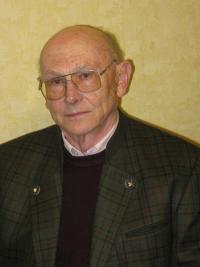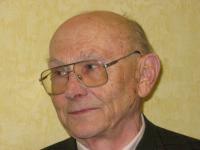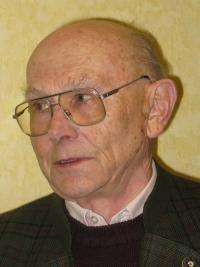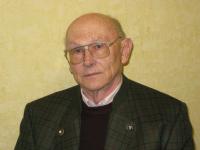“The desire to be free again was much stronger than the grief over the loss of my native land. When I got older this changed as well.”

Stáhnout obrázek
Ernst Schmidt was born on 18 September, 1929, in the town of Osoblaha (Hotzenplotz in German) which is located directly on the border of Bohemia and Upper Silesia. His father Rudolf was a first-world-war reconnaissance pilot, serving in the army of the Hapsburg Empire (the Royal and Imperial Military – “K. und K. Militär”). He was called to duty again in World War II, this time not as a pilot, but as the director of the military-vehicle fleet in Hradec Králové. Ernst Schmidt was since very early on a member of the Hitlerjugend. He belonged to ‘Jungvolk’, a branch of Hitlerjugend accommodating 10 to 14 year olds. In the middle of April 1945, the Soviet army and the 1st Czechoslovak army corps approached the border of former Czechoslovakia. For the German population of Czechoslovakia, this meant the beginning of their resettlement. The Germans started to leave Czechoslovakia en masse in fear of retribution and behind stayed only those who had to take care of their farms and households. Ernst Schmidt and his father also were on the run. They wanted to make it to the west into American captivity which promised much better treatment than Soviet internment camps. On their way to the west, their group consisting of a large number of German soldiers and civilians was ambushed by Czechoslovak partisan units several times. Eventually, they were intercepted by Soviet forces. They were redirected to a Soviet internment camp. On the way there, they were frequently harassed by the Czechoslovak population that took advantage of the situation to air their grievances and seek revenge. Ernst Schmidt was later released from the camp and sent home but his father stayed in Soviet captivity till 1949, when he was finally allowed to return home. In captivity he was a slave laborer in a labor camp on the Crimea peninsula. Ernst came back to Osoblaha without knowing what was going to happen to him. After his return to Osoblaha, Ernst and his sister Ilse lived from hand to mouth for a few months. On August 30, Ernst was conscripted for forced labor in a coal mine. In accordance with a presidential decree issued on 19 September, 1945, all Germans and Hungarians that had been deprived of their Czechoslovak citizenship (pursuant to another presidential decree issued on 2 August, 1945) were subject to forced labor for the period before their forced deportation from Czechoslovakia. All males between the age of 14 – 60 and females between the age of 15 – 50 were subject to forced labor. What kind of work one had to do or the way the supervisors behaved to the workers was pure chance and differed substantially from case to case. In Mr. Schmidt’s case, the living conditions and the behavior of the guards did not differ much from those in the later Communist camps. The workers weren’t told at first when they’d come out of the shaft or for how long they would have to work and what would happen with them afterwards. As the days and weeks passed, rumors were spreading about their deportation from Bohemia and resettlement in Germany. These rumors, however, only exacerbated the fears among the workers that they would never again see their relatives. It was only later that the information came through to them, that the Americans would not allow the break-up of the families. Ernst Schmidt was informed about his deportation to Germany only two weeks before his release from the coal mine. He returned to Osoblaha but after a few days, he was transferred to Bavaria on an open cattle car together with other Germans. After a rather complicated beginning in Germany, he was able to start a new life in his newly found home. He completed his education and studied at university in Munich. He met his future wife at a reunion of the German expellees in 1956. They have three children and live in Eichenau near Munich.



